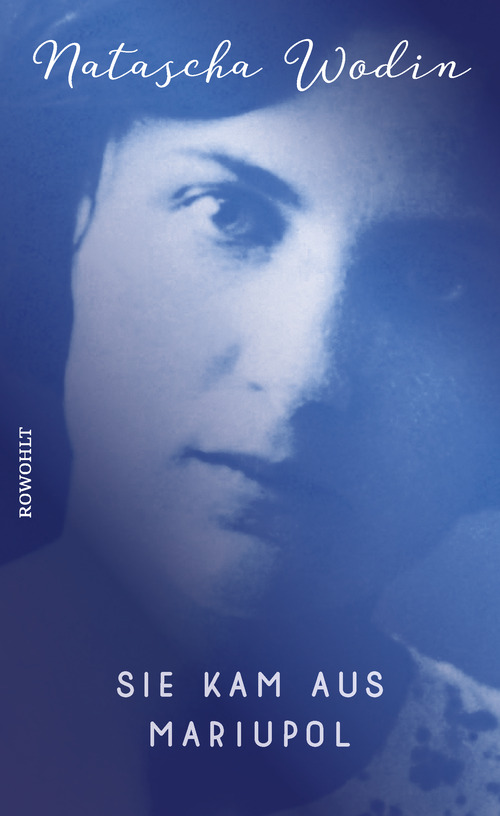Literature tip: „Sie kam aus Mariupol“ by Natascha Wodin (German language)
- 26. March 2017 - Family, General, Germany, Literature, Personalities
In February 2017 the German publisher Rowohlt released the new book of writer Natascha Wodin. “Sie kam aus Mariupol” not only tells the moving story of her mother but also describes her ancestry research as such vividly. The literary biography was rightly awarded with the Leipzig Book Fair Prize 2017. We hope it will be translated into English one day.
A hopeless search?
At the beginning of her search, Natscha Wodin doesn’t know much about her mother: Just her name (a quite common one as well), her birth date, place of birth (Mariupol in Ukraine), her date of marriage and her arrival in Germany. Two photographs and an old icon are furthermore preserved. She also has memories from her childhood, when her mother talked about her family. But she can’t be sure about the details that might be compromised by her imagination as a child. And her mother killed herself when Natascha Wodin was only 10 years old.
More or less by chance, the author finds a short entry about her mother in the internet and comes into contact with a private genealogist that lives in Russia. It is due to his tireless efforts that in the end she doesn’t know all about her mother, but sees her in a completely new light and better understands her uprooting and deep sorrow.
Natascha Wodin’s trip into the past is an emotional roller coaster. She experiences moments of happiness due to discoveries she couldn’t have hoped for. Repeatedly there are small genealogical miracles, brick walls are overcome. Even her childhood memories often prove to be real. In the end, Natascha Wodin is able to hear a recording of the singing voice of her uncle and read the memories of her aunt.
The history she uncovers isn’t a happy one. Her mother is born into the civil war following the Russian Revolution. In the Soviet state she is a leper due to her family background. Separated from her family she ends up as a forced laborer in Germany with her husband. Her Ukrainian origin makes her just better than Jews and Sinti and Roma in Nazi-Germany. Even after the Second World War she doesn’t find happiness. Again as a “Russian” she is an outcast. And she is living under often inhumane conditions: At first in a shed, later in a camp for Displaced Persons and in the end in a housing scheme for homeless foreigners. On top of all that she was in an unhappy marriage.
A family!
For Natascha Wodin the trip into the past leads to something she didn’t have before: A family history! And an exciting – but mostly tragic – one about expropriation, plunders, Russian prisioner camps and banishments, suicides and even a murder as well as again and again the fight for survival.
Most of its protagonists are already dead. Natascha Wodin’s grief about not having met them shines through. The siblings of her mother did live much longer than their sister, even tried to find her. Her daughter ends up wondering: Would the life of her mother have ended differently, had she only known about the whereabouts of her family? For Natascha Wodin it is interesting to find out that her own passions for literature and the opera run in the family. In the end she even finds living relatives. They didn’t know her mother, but to one cousin she establishes a family relationship.
There are times in the book when Natascha Wodin isn’t sure why she is doing all this. The search is frustrating at times and the findings can be discouraging. In the end it seems to have been worth it.
Literature-, history- and genealogy-fans can be very happy to be able to follow Natascha Wodin’s search for her mother in any case. I think she was rightly awarded the Leipzig Book Fair Prize. The book calls attention to historic topics that aren’t unknown but often not in the center of public attention. The history of forced laborers from the east in Nazi-Germany is one example. At times this is exciting as a detective story. You won’t be able to put the book down in order to find out which empty spaces Natascha Wodin might still be able to fill. Much is discovered but not everything. This is how genealogy works.
You can win a copy of the German book
Thanks to the publisher Rowohlt we are able to give away one copy of the book. If you should be interested even though it is in German, you are free to participate. But please note that we can only send it to a German address as well.
As the book so vividly describes the ups and downs of genealogy, reaching brick walls and overcoming them, we would love to hear your best genealogy breakthrough story. Just leave it in the commentaries to this blog post or our announcements in the social networks until Sunday, 2 April 2017. If you prefer e-mailing your story, please send it to info@beyond-history.com. We will hold a random drawing from all submissions afterwards. There is no recourse to legal Action.
Of course we would love to hear your story even if you don’t want to have the book. Just add short information that you don’t want to be part of the prize draw.


0 comments